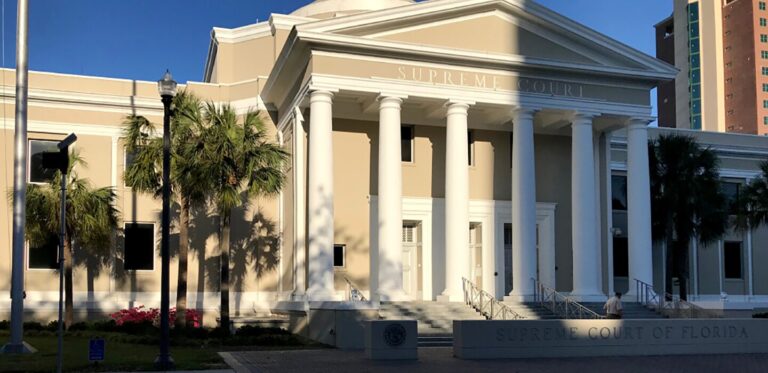The Florida Supreme Court has allowed judicial candidates in the state to publicly express their political views as long as they do not disclose party affiliation.
The Supreme Court’s decision was tucked away in a ruling on how to punish a St. Johns County judge who told potential voters she was a conservative in a campaign message for 2022. Judicial elections are supposed to be nonpartisan, but the Supreme Court found the judge’s comments were ethically acceptable.
“Describing oneself as a ‘conservative’ does not indicate bias against anyone or for or against any issue,” the justices ruled, overturning the Judicial Qualifications Commission’s decision and the confirmation of County Judge Casey L. Woolsey, who faces disciplinary action.
Judges have publicly reprimanded him for even allowing political party registration to answer questions from the press, but Woolsey has never said he is a Republican. “The statement, ‘I am a conservative,’ is not partisan in the JQC’s view, either in nature or even if made during a campaign in a predominantly Republican area,” the court ruled.
“Our judicial code does not prohibit candidates from discussing their philosophical beliefs,” the justices wrote, citing previous decisions.
In South Florida, lawyers and legal experts called the decision “bizarre” and predicted it would usher in an era of overtly partisan judicial crusades.
“Today’s decision not only undermines public confidence in the judiciary, it will likely lead to a flood of disbarment motions related to political speech during election campaigns,” said Anthony Alfieri, director of the Center for Ethics and Public Service at the University of Miami School of Law.
For years to come, candidates will complain about the language their opponents use on the campaign trail, Alfieri said, and the JQC will get bogged down in “abstract, definitional debates about the meaning of political labels across the ideological spectrum.”
Broward County attorney and legal blogger Bill Gelin made a similar prediction: “The court will be playing word games as candidates test the boundaries of what they can and can’t say during the election season,” said Gelin, who runs the independent court news and gossip site JAABlog and was first to report on Thursday’s court decision.
Bob Jarvis, a law professor at Nova Southeastern University, called the decision “shocking” but “expected” given the increasingly conservative makeup of the Florida Supreme Court, which is made up entirely of Republican appointees.
“We live in highly partisan times, and this decision shouldn’t come as a surprise,” Jarvis said. “They argue that the word conservative means different things to different people. You can be a conservative and say you support a strong national defense, low taxes and small government. That doesn’t predict judicial decisions. But ‘conservative’ and ‘liberal’ are proxy terms and almost always indicate a candidate’s partisan leanings.”
Mitch Ceasar, a former Broward County Democratic Party chairman, agreed, predicting candidates will make their political stances by announcing their political philosophies and asking voters to fill in the blanks.
“Even in Democratic Broward County, we don’t want that to happen,” said Ceasar, the attorney. “In this day and age, it’s obvious that a certain person is affiliated with a certain party. It goes beyond simply implying political affinity, and when it comes to judges and judicial candidates, that’s unacceptable.”
Alfieri said the Supreme Court’s decision “contradicts the letter, history, structure and policy of the Florida Code of Judicial Conduct.”
©2024 South Florida Sun-Sentinel. Distributed by Tribune Content Agency, LLC.

